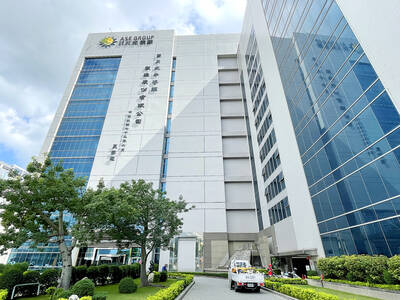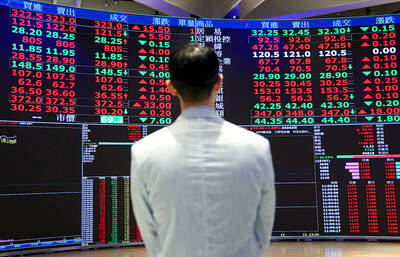China flagged yesterday that it would let the yuan resume its rise at some point as it unwinds the super-loose policies it has been pursuing to prop up the world’s third-largest economy.
China is under intense pressure from the US and Europe to abandon the exchange rate peg it instituted of around 6.83 yuan per dollar since mid-2008 to preserve the competitiveness of its exporters during the international financial crisis.
Speaking during the annual session of China’s parliament, central bank governor Zhou Xiaochuan (周小川) said Beijing would eventually have to drop this “special” yuan policy, one of a range of emergency measures taken to cushion the blow to growth.
“Practice has shown that these policies have been positive, contributing to the recovery of both our country’s economy and the global economy,” Zhou told a news conference.
“The problem of how to exit from these policies arises sooner or later,” he added.
China would have to be careful in withdrawing the extraordinary stimulus it has provided since late 2008.
“If we are to exit from these irregular policies and return to ordinary economic policies, we must be extremely prudent about our choice of timing. This also includes the renminbi exchange rate policy,” he said.
Beijing fears a tide of capital would flow into China if speculators sense the yuan is strengthening.
Zhou was speaking after the bank issued a statement reaffirming a pledge made a day earlier by Premier Wen Jiabao (溫家寶) to keep the yuan “basically stable” this year.
Economists say that phrasing is broad enough to accommodate a renewed appreciation of the exchange rate — a decision that would have to be taken by Wen and the State Council, China’s Cabinet.
The People’s Bank of China has already ordered banks twice this year to increase the proportion of deposits they must hold in reserve, rather than lend out, in order to gently slow the economy and nip inflation in the bud.
However, unlike Australia or Malaysia, the central bank has yet to increase interest rates, leaving investors waiting anxiously for clues as to how rapidly it might withdraw its stimulus.
Zhou signaled the bank would tread carefully and “flexibly” in implementing its relatively loose pro-growth monetary policy.
“Even though the global economy is at present trending towards recovery, the influence of the crisis is still very serious,” he said.
Chinese exports plunged 16 percent last year and Commerce Minister Chen Deming (陳德銘) said it might take them two to three years to regain pre-crisis levels.
Speaking at the same news conference, Chen defended Beijing’s policies to help its exporters as being in line with global trade rules and said China’s trade surplus reflected broad economic factors, not a cheap exchange rate.
Turning to the hot topic of lending to local governments, the central bank chief warned banks they were taking risks by financing some projects that were unviable and by extending credit against the collateral of land because the price of that land might fall.
Land prices soared last year and critics fear a collapse in prices could expose the weakness of local government finances and sow a new crop of bad loans on the books of the nation’s banks.

EXPANSION: The investment came as ASE in July told investors it would accelerate capacity growth to mitigate supply issues, and would boost spending by 16 percent ASE Technology Holding Co (ASE, 日月光投控), the world’s biggest chip assembly and testing service provider, yesterday said it is investing NT$17.6 billion (US$578.6 million) to build a new advanced chip packaging facility in Kaohsiung to cope with fast-growing demand from artificial intelligence (AI), high-performance-computing (HPC) and automotive applications. The new fab, called K18B, is to commence operation in the first quarter of 2028, offering chip-on-wafer-on-substrate (CoWoS) chip packaging and final testing services, ASE said in a statement. The fab is to create 2,000 new jobs upon its completion, ASE said. A wide spectrum of system-level chip packaging technologies would be available at

Taiwan’s foreign exchange reserves hit a record high at the end of last month, surpassing the US$600 billion mark for the first time, the central bank said yesterday. Last month, the country’s foreign exchange reserves rose US$5.51 billion from a month earlier to reach US$602.94 billion due to an increase in returns from the central bank’s portfolio management, the movement of other foreign currencies in the portfolio against the US dollar and the bank’s efforts to smooth the volatility of the New Taiwan dollar. Department of Foreign Exchange Director-General Eugene Tsai (蔡炯民)said a rate cut cycle launched by the US Federal Reserve

HEAVYWEIGHT: The TAIEX ended up 382.67 points, with about 280 of those points contributed by TSMC shares alone, which rose 2.56 percent to close at NT$1,400 Shares in Taiwan broke records at the end of yesterday’s session after contract chipmaker Taiwan Semiconductor Manufacturing Co (TSMC, 台積電) hit a fresh closing-high amid enthusiasm toward artificial intelligence (AI) development, dealers said. The TAIEX ended up 382.67 points, or 1.45 percent, at the day’s high of 26,761.06. Turnover totaled NT$463.09 billion (US$15.22 billion). “The local main board has repeatedly hit new closing highs in the past few sessions as investors continued to embrace high hopes about AI applications, taking cues from a strong showing in shares of US-based AI chip designer Nvidia Corp,” Hua Nan Securities Co (華南永昌證券) analyst Kevin Su

Nvidia Corp’s major server production partner Hon Hai Precision Industry Co (鴻海精密) reported 10.99 percent year-on-year growth in quarterly sales, signaling healthy demand for artificial intelligence (AI) infrastructure. Revenue totaled NT$2.06 trillion (US$67.72 billion) in the last quarter, in line with analysts’ projections, a company statement said. On a quarterly basis, revenue was up 14.47 percent. Hon Hai’s businesses cover four primary product segments: cloud and networking, smart consumer electronics, computing, and components and other products. Last quarter, “cloud and networking products delivered strong growth, components and other products demonstrated significant growth, while smart consumer electronics and computing products slightly declined,” compared with the